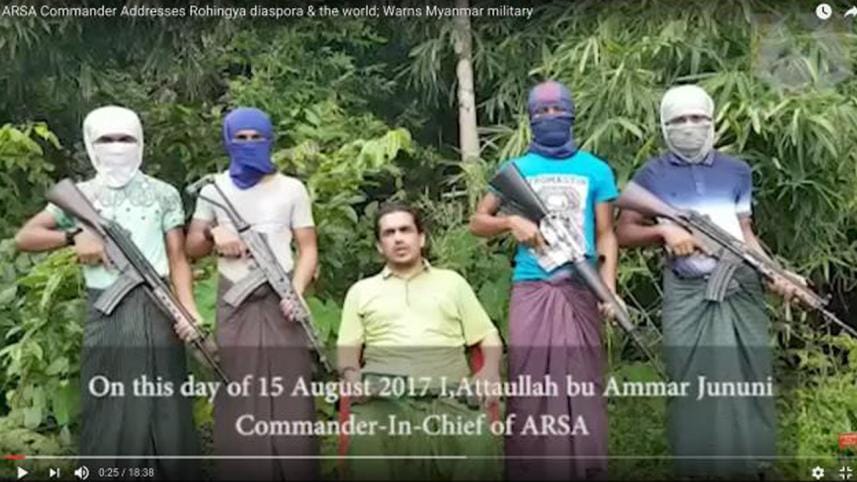Rohingya insurgency declares ‘open war’ in Myanmar

The sudden attacks by Rohingya insurgents on police and army posts in Myanmar’s Rakhine State was a defensive move aimed at pre-empting an escalating security force crackdown on both the rebels’ military wing and Rohingya civilian communities, spokesperson of the rebel group said.
In an exclusive interview with Asia Times, the Arakan Rohingya Salvation Army representative who identified himself simply as ‘Abdullah’ said its August 25 attacks were staged in 'self-defense' and would continue until Rohingya rights are restored.
READ MORE: Violence in Rakhine State: Deadly attacks in Myanmar kill 89
He insisted that the military crackdown had gathered pace following the reinforcement of security forces by an estimated 400 troops of the crack 33rd Light Infantry Division on August 10-11, the newspaper reports.
It had left them no choice other than to strike back in defense of civilian communities facing what he described as further killings and abuses by security forces.
Speaking in the exclusive interview on the day after the attacks of August 25, Abdullah said the campaign of Myanmar military suppression and the rebel counter-punch has now pushed the majority Muslim northern region of Rakhine state into a state of “open war.”
He also vowed “continued resistance” until Rohingyas’ demands for the restoration of citizenship rights within Myanmar are met.
“In the two days before the attacks the military was preparing to strike ARSA bases across the region,” said Abdullah. “We had no choice but to take defensive measures.”
Abdullah said one major source of Rohingya alarm that drove the decision by ARSA commanders to launch a counter-offensive was the sealing off of Zay Di Pyin village in Rathedaung by security forces and armed Buddhist civilians from surrounding hamlets, the Hong Kong based newspaper reports.
The ARSA spokesperson gave the interview to Asia Times on condition that in the interests of their security its location not be disclosed. However, Abdullah noted that he had been directly authorised by ARSA “commander-in-chief” or “emir” Ataullah Abu Ammar Jununi to set out the militants’ current position and objectives.
The news agency was able to confirm through reliable independent sources that the ARSA representative and the rebel commander are indeed in daily contact.
An urban, middle-aged man with a polished command of English, Abdullah was accompanied to the interview by two younger Rohingya associates in their late twenties.
Discussing the backdrop to the rebel offensive of August 25, he asserted that the widening military crackdown and the blockade of Zay Di Pyin had been deliberately timed to provoke clashes and undermine the findings of the commission on the Rakhine crisis headed by former United Nations secretary-general Kofi Annan, Asia Times reports.
“Knowing that Kofi Annan was doing good work, the military had a clear plan to jeopardise it and derail the report,” he said.
Regarding the future of the conflict, Abdullah said, “A political solution based on the restoration of Rohingya citizenship and basic civil rights within Myanmar was ultimately the only solution.”
“In the short term our army is sending a message to the world that the injustice we have been subjected to is deep-rooted,” he said.
“We need justice and we are hopeful that the international community will be there with political pressure. We are now at the final stage before full-fledged genocide, so we have to defend our civilian population.”
“We are not though looking to develop a long-term guerrilla struggle. In the longer term, our military and political wings will work together to push for dialogue. Even if political reconciliation does not seem viable at the moment, we should not lose spirit and stop our struggle. Our message to Arakan-born Rakhines is that we can live together. Arakan must be enjoyed by Rohingya and Rakhines together.”
Abdullah alleged that while the presence of an elected civilian government in Myanmar served positively to balance off hard-line military policies, the position of State Counsellor Aung San Suu Kyi was not in the short term likely to facilitate political dialogue.
“She does not have good, direct channels of information,” he said. “She’s trapped between the army and Rakhine members of the (governing) NLD (National League for Democracy) who are feeding her distorted information. She does though have a moral duty at least to go and see for herself.”



 For all latest news, follow The Daily Star's Google News channel.
For all latest news, follow The Daily Star's Google News channel.
Comments